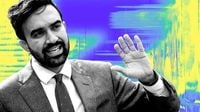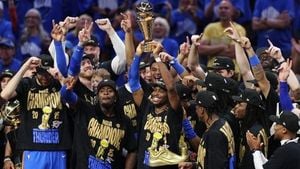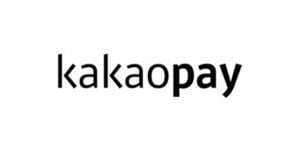As New York City approaches its pivotal Democratic mayoral primary on June 24, 2025, the race has emerged as one of the most unusual and ideologically charged in recent memory. At the forefront are two starkly contrasting figures: Andrew Cuomo, the former governor seeking a political comeback, and Zohran Mamdani, a 33-year-old democratic socialist assemblyman whose rise signals a generational and ideological shift in the city’s political landscape.
City Council Speaker Adrienne Adams, a moderate representative from southeast Queens, has found herself caught in the crosscurrents of this progressive battle. On June 21, at the National Action Network headquarters in Harlem during a speech hosted by Rev. Al Sharpton, Adams notably declined to publicly endorse fellow Working Families Party-backed candidates Zohran Mamdani and Brad Lander. Instead, she urged the audience to rank her as their number one choice in the ranked-choice voting system, omitting any mention of Mamdani and Lander despite their shared party backing.
This public reticence came just a day after Adams issued a statement supporting the Working Families Party slate, highlighting the complex and sometimes fraught dynamics within the progressive camp. Her reluctance to fully embrace Mamdani, who represents a more left-wing, democratic socialist vision, underscores the challenges of uniting a coalition that spans moderate Black voters and younger, more radical progressives. Adams’s hesitation could prove costly, as her supporters might also rank Cuomo, potentially diluting the progressive vote and aiding Cuomo’s frontrunner status.
Cuomo’s campaign enjoys the backing of a powerful super PAC, Fix the City, which has raised an unprecedented $24 million. Much of this funding has been funneled into attack ads targeting Mamdani, painting him as an impractical idealist. Mamdani’s proposals — including free public transit, city-run grocery stores, and rent freezes — have been labeled "pie in the sky" by Adams herself during her June 21 speech, a remark interpreted as a veiled critique of his platform.
Despite these attacks, Mamdani’s appeal among younger voters is undeniable. His campaign, designed to resonate with Gen Z, leverages fast-paced, emotionally charged videos on platforms like TikTok, blending humor and frustration to capture the zeitgeist of a generation disillusioned with traditional politics. Recent polls suggest Mamdani could secure up to 60% of first-choice votes among 18- to 34-year-olds, reflecting a profound cultural and political shift in New York City’s electorate.
However, New York’s demographic and political complexity means Mamdani’s progressive surge is not without its limits. His anti-Zionist stance, for example, alienates some moderate Jewish voters, while his base remains largely concentrated in left-leaning neighborhoods. Meanwhile, Cuomo holds strong support among Black voters and organized labor, groups that remain pivotal in citywide elections.
The ideological polarization in this mayoral race echoes a historic parallel from 1975 San Francisco. That year, George Moscone, a progressive state legislator, narrowly defeated conservative Republican John Barbagelata in an election similarly marked by generational and ideological divides. Moscone’s coalition of youth, countercultural activists, and marginalized communities reshaped the city’s politics, much as Mamdani’s campaign seeks to do in New York. While the circumstances differ, the comparison highlights how urban electorates can pivot dramatically during moments of social and political transformation.
Yet, unlike Moscone, who was a seasoned political insider and state Senate majority leader, Mamdani’s political experience is more limited, and he faces a well-funded and entrenched opponent in Cuomo. The stakes are heightened by the fact that Cuomo’s campaign is aggressively framing the race as a choice between experience and inexperience, stability and radical change.
Amid this contest, progressive allies have rallied behind Mamdani and Lander, who cross-endorsed each other on June 20. Brad Lander, a progressive city council member known for his advocacy on immigrant rights and tenant protections, has condemned Cuomo’s record sharply, calling him “the candidate of the enemies of civil rights.” Both Lander and Mamdani emphasize solidarity and principled leadership, refusing to attack each other and instead focusing their efforts on preventing Cuomo’s return.
Organizations like Jews For Racial & Economic Justice (JFREJ) have thrown their support behind Mamdani and Lander, framing the election as a chance to break from divisive, fear-based politics. Audrey Sasson, JFREJ’s executive director, highlights the duo’s commitment to vulnerable New Yorkers across diverse communities and praises their courage in confronting the challenges posed by Trump-era politics. Sasson points to recent events where Lander was arrested while accompanying immigrants to hearings, and Mamdani was among the first to stand in solidarity with him, underscoring their hands-on approach to leadership.
However, the race is not without its tensions. Adams has expressed frustration with the progressive coalition, suggesting she is being used to secure Black votes without being fully embraced as a leader. She stated, “Black, working-class communities like mine have long been the backbone of the Democratic Party... But too often, we’re seen only for our political value, not for our leadership.” This sentiment reveals the complex interplay of race, ideology, and political strategy shaping the mayoral contest.
As the June 24 primary nears, the city stands at a crossroads. The election is not just about who will occupy City Hall, but about the future direction of New York politics. Will the city embrace a bold, progressive vision embodied by Mamdani and Lander, energized by a new generation and digital campaigning? Or will it revert to the familiar, if flawed, leadership represented by Cuomo, backed by deep-pocketed interests and a coalition of established power brokers?
One thing is clear: this mayoral race is reshaping how campaigns are run and how voters engage with politics in the city. The use of ranked-choice voting, cross-endorsements, and targeted digital outreach reflects a new political landscape where coalition-building is both more complex and more critical than ever.
Whether Mamdani’s insurgent campaign succeeds or not, his ability to galvanize young voters and challenge the status quo signals a potential realignment in New York’s political fabric. As one observer noted, “It wouldn’t be wise to bet against the campaign of a rising 33-year-old.”




